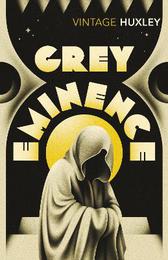
|
Grey Eminence
Paperback / softback
Main Details
| Title |
Grey Eminence
|
| Authors and Contributors |
By (author) Aldous Huxley
|
|
Introduction by David Bradshaw
|
| Physical Properties |
| Format:Paperback / softback | | Pages:320 | | Dimensions(mm): Height 198,Width 129 |
|
| Category/Genre | Literary studies - fiction, novelists and prose writers
Christianity |
|---|
| ISBN/Barcode |
9780099477822
|
| Classifications | Dewey:944.032092 |
|---|
| Audience | | General | | Tertiary Education (US: College) | | Professional & Vocational | |
|---|
|
Publishing Details |
| Publisher |
Vintage Publishing
|
| Imprint |
Vintage Classics
|
| Publication Date |
7 April 2005 |
| Publication Country |
United Kingdom
|
Description
The life of Father Joseph, Cardinal Richelieu's aide, was a monstrous paradox. After spending his days directing operations on the battlefield Father Joseph would pass the night in prayer, or in composing spiritual guidance for the nuns in his care. He was an aspirant to sainthood, a practising mystic, yet his ruthless exercise of power succeeded in prolonging the Thirty Years War, with all its unspeakable horrors. In his masterful biography, Huxley explores how a religious man could lead such a life and how an individual could reconcile the seemingly opposing moral systems of religion and politics.
Author Biography
Aldous Huxley (Author) Aldous Huxley was born on 26 July 1894 near Godalming, Surrey. He began writing poetry and short stories in his early 20s, but it was his first novel, Crome Yellow (1921), which established his literary reputation. This was swiftly followed by Antic Hay (1923), Those Barren Leaves (1925) and Point Counter Point (1928) - bright, brilliant satires in which Huxley wittily but ruthlessly passed judgement on the shortcomings of contemporary society. For most of the 1920s Huxley lived in Italy and an account of his experiences there can be found in Along the Road (1925). The great novels of ideas, including his most famous work Brave New World (published in 1932, this warned against the dehumanising aspects of scientific and material 'progress') and the pacifist novel Eyeless in Gaza (1936) were accompanied by a series of wise and brilliant essays, collected in volume form under titles such as Music at Night (1931) and Ends and Means (1937). In 1937, at the height of his fame, Huxley left Europe to live in California, working for a time as a screenwriter in Hollywood. As the West braced itself for war, Huxley came increasingly to believe that the key to solving the world's problems lay in changing the individual through mystical enlightenment. The exploration of the inner life through mysticism and hallucinogenic drugs was to dominate his work for the rest of his life. His beliefs found expression in both fiction (Time Must Have a Stop,1944, and Island, 1962) and non-fiction (The Perennial Philosophy, 1945; Grey Eminence, 1941; and the account of his first mescaline experience, The Doors of Perception, 1954). Huxley died in California on 22 November 1963.
ReviewsPenetrating and vivid... This biography will rank amongst Huxley's best books. He never wrote better; he never hit upon a more interesting theme * Sunday Times * A remarkable biography * Observer * Grey Eminence is lucid, scholarly and thoughtful. Huxley has used all his ingenuity to explain this extraordinary character * New Statesman *
|